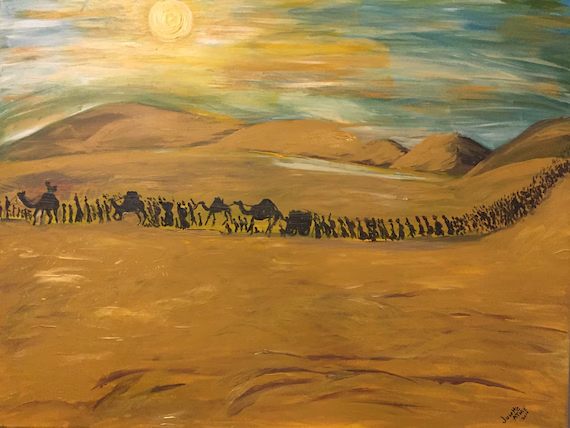Feeding the Hungry Crowd
One day, Jesus was feeling tired. He had been talking to the people all day and healing them, and he wanted to go to a quiet place to have a little time to himself.
He and his disciples boarded a boat and sailed across Lake Galilee to a lonely beach. There they landed, pulled the boat up onto the shore and walked up a hill to rest.
Although they were alone, some people had seen where they went, and the news that Jesus was there quickly spread.
Soon people started to walk from the towns and villages to see him, and to be cured of their diseases.
The disciples wanted to send the people away, but Jesus felt sorry for the people. He walked among them, talking to them, answering their questions and making the ill ones well again. More and more arrived until there were thousands of them.
In the evening, a disciple said to Jesus; 'It's time these people went home. Send them away now so they can find food. There is nothing here for them to eat.
'They are hungry, we must feed them first, said Jesus.
'There is nowhere to buy food, and even a huge amount of money would not buy enough bread for all these people, said Philip, one of the disciples.
Andrew, another of the disciples, said to Jesus. 'There is a boy here who has five small barley loaves and two fish, but that's not much for all these people.
Jesus looked down at the boy. 'May I take your food? He asked. 'Yes, Master, said the boy, and gladly gave it to Jesus.
'Tell the people to sit down on the grass in groups, Jesus said to the disciples. The disciples walked through the crowd, asking them all to sit down.
Altogether, there were about five thousand men, women and children.
Jesus held up the boy's five small loaves and two small fish, and said a prayer of thanks to God.
Then he broke up the bread and fish into pieces and handed them to the disciples. 'Give them to the people, he said.
The disciples began to pass around the food, and the more they gave out, the more there was. They were very surprised and puzzled.
Everybody began to eat, and they all had as much as they wanted.
When the meal was over. Jesus said to the disciples, 'Collect up all the leftover food. Nothing must be wasted.
The disciples walked over the hillside, picking up the pieces of bread and fish.
When they'd finished, they'd filled twelve baskets with food.











Comments
Post a Comment